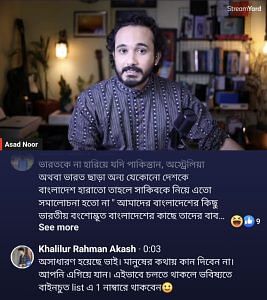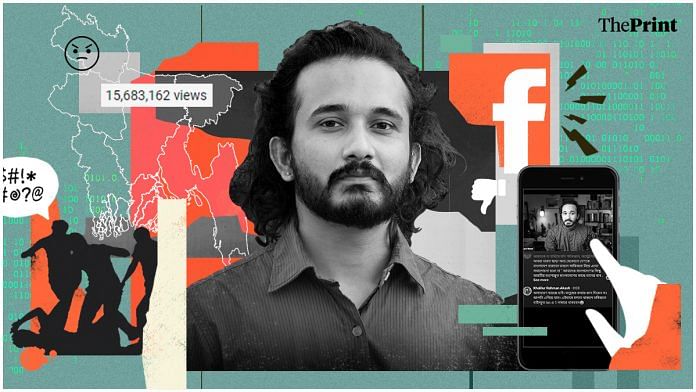Asad Noor has a new phone number and a new home address. The exiled Bangladeshi atheist blogger and human rights activist says very few people have his new contact details. His family members back in Bangladesh are not among them. And he has told no one where he is hiding in India ever since videos calling for his beheading surfaced from Europe.
Noor, 32, says he now knows what it feels to be like Salman Rushdie.
“I may not be able to write like Salman Rushdie, but I share the same predicament for hurting religious sentiments,” he tells ThePrint from an undisclosed location, adding that he might be killed much before reaching Rushdie’s age.
Noor hardly steps out of his house, spending days and nights in front of his laptop. He clacks away at his keyboard, compiling reports of attacks on minorities in Bangladesh, keeping track of online hate, and preparing vlogs. He has time for little else these days, and his dream of becoming a cinematographer seems distant, too. “I cannot even meet people because of [the] risk to my life. How can I work on a documentary film project?” he rues.
India over Bangladesh
The relative anonymity India offers, however, helps Noor breathe easy at times. He feels free to go for walks in the evenings, have a rasta chai or sit at a cafe alone, scribbling down points for his next vlog on a paper napkin, waiting for his coffee.
“This is a big and complex country. But there is freedom of expression, and there are debates. I see very vocal defenders of democracy and secularism speak up from every platform. It is not perfect, but at least I am alive here. Islamic fundamentalism allows no debates. I cannot live like that in Bangladesh,” he says.
Noor doesn’t get time to read a lot these days. But whenever he does, he goes back to the literary works of Bangladeshi authors Humayun Azad and Taslima Nasreen and Bengali novelist Samaresh Majumdar. All three writers have helped him think freely.

But he is paying the price for standing up to power – both political and religious. Religious fundamentalists in Bangladesh have been after him since he started blogging in 2013. In a report published on 7 August 2020, Amnesty International wrote that authorities in Bangladesh must refrain from “harassing and intimidating” Noor’s family members. The local police raided the blogger’s house in Amtali village in the southern Barguna district in the dead of night on 14-15 July 2020, hounding his parents when they couldn’t find him. “Police raided their house again on 16 July. On 18 July in the early morning, the police raided the house again and detained Asad’s father, Tofazzal Hossain, his mother, Rabeya Begum, two younger sisters (one was minor), and two other relatives, without any formal charge or warrant. The local police kept the family members in detention for 40 hours before releasing them in the night of 19 July,” the report read.
Such instances are precisely why Noor prefers not to remain in touch with his family. “I can only hope they are happy and safe.”
Also read:
Threats won’t stop
Now that the calls for his killing have gone international, he says he must tell the world about how radical society has become in his homeland. “Free speech is a joke in a country where apostates are stabbed in the streets. And now Bangladeshi citizens are threatening me from abroad,” he alleges.
On 8 and 10 August, social media influencers Bijoy Hossain Tanjil from Paris and Farhan Choudhury from the UK put out videos advocating for Noor’s execution on the grounds of apostasy. They have since deleted the videos, but threats against the blogger continue to pour. “I fear I may not have much time,” he says.
In the now-deleted video, Choudhury, who has about 1,74,000 followers on Facebook, asked what the fate of heretics like Noor should be. One of his followers suggested cutting Noor’s tongue off to stop him from criticising the Prophet Muhammad. Another urged for his hands to be chopped so that he couldn’t write against Islam. “Choudhury had said I would meet the same fate as the school teacher Samuel Paty, who was beheaded in France on 16 October 2020 for criticising Islam,” recalls Noor.
Tanjil and Choudhury are both Bangladeshis by birth. Though they have relocated to Europe, Noor says they have not been able to overcome the hate they feel for anyone who critiques Islam.
Also read:
Tracking hate
Noor traces this intolerance to madrasas, which he attended while growing up in Bangladesh.
“My parents didn’t know any better. What is taught there makes you look at people from other faiths with derision, if not direct hate. The huzurs [religious preachers], most of whom are very popular in Bangladesh’s hinterland, routinely preach religious extremism. The waj mehfils [events meant to spread the word of Islam] are most often hate gatherings. Hate gets normalised from schools and social and religious gatherings,” he says.
Despite what madrasas taught him, books told Noor of a world beyond. Dhaka’s cosmopolitanism further opened his eyes to other ways of life, challenging the notions he had held while growing up in his native village of Gopalgunj. In 2013, Noor started blogging about what he found problematic around him – the Islamisation of Bangladesh’s society and polity, and the growing threat to minorities in the country.

“Ever since Zakir Naik entered the scene with his online preachings, people got to know that you can dress modern, speak in English language and yet remain backward. The problem was no longer in the hinterlands. Radicalisation was becoming a reality in every nook and cranny of this country,” says Noor.
On social media, he documents any instance of attack on minorities that he comes across. In September 2012, in the Cox’s Bazar area of Chittagong division, one Uttam Kumar Barua, a Buddhist, was accused of hurting religious sentiments. Buddhist houses, shops, and temples were looted and set on fire. Years passed, new houses were built on the ruins of the old, and new temples came up where old temples once stood. But no action was taken against the men who went on a rampage. To date, there is no trace of Barua.
Noor then spoke about October of 2016, when one Roshash Das from the Nasirnagar Upazila in Brahmanbaria district of Chittagong division, was arrested and tortured for a ‘religious hate-spewing’ Facebook post. Local Awami League leaders created an uproar, interrogating and torturing Das until they learnt that the poor man didn’t even have a Facebook account.
In 2017, the same fate awaited Titu Ray from Rangpur, who was arrested and tortured in jail for an offensive post until it was learnt that he never uploaded what he was being accused of.
The list gets longer and longer, but Noor doesn’t stop.
“I try to show what mainstream news media in Bangladesh cannot. I ask questions most of our journalists back home do not for fear of life and limb. I have a strong network of young activists across Bangladesh who track hate wherever it happens and send me reports and videos. I put them up on my social media accounts.”
Also read:
The price of truth
As Noor became famous, protests against him erupted in both the digital and physical realms. But real trouble began in January 2017, when he was just 25. Radical Islamist groups accused Noor of allegedly defaming the Prophet, and called for his arrest. On 11 January 2017, Bangladesh police charged him with defamation of religion under the country’s 2013 Information and Communication Technology Act.
Noor was arrested on 26 December 2017 at the Hazrat Shahjalal International Airport in Dhaka just as he was about to board a flight to Kathmandu. He spent eight months in jail and saw angry demonstration against him after being released on bail. He was re-arrested on charges of peddling drugs, which he claims were false. He was released on bail four months later, after which he decided to leave Bangladesh secretly. This was February 2019; Noor has been hiding in India since.
It’s been four years since he left the country, but the charges against him have not been dropped.
Noor’s release from jail made the Islamist group Hefazat-e-Islam Bangladesh demand his execution.
In July 2020, he published blogs from India on attacks on the local Buddhist community in Rangunia Upazila. An Awami League leader filed a lawsuit against him under the country’s Digital Security Act for “hurting religious sentiments”.
Noor knew his homeland was no longer safe for him, but never expected the hate to trickle to England and France as well. He is convinced that no place is safe for him now, but continues to stand by his principles.
“[Bangladesh’s] GDP has gone up, but economic disparity prevails, and so does corruption. People are unhappy, and much of the country is poor and illiterate. They have lost hope from this life and hence look forward to an afterlife. And that is where peddlers of religion come in with promise of jannat and to preach hate for those who do not follow their faith. Someone had to speak up. I did.”
He wasn’t the only one to raise his voice against such practices; others like him have paid a heavier price. Between 2013 and 2016, secular and atheist writers and bloggers in Bangladesh, as well as foreigners, members of the LGBTQIA+ community and religious minorities, were killed in Bangladesh by religious fundamentalists for allegedly attacking Islam and the Prophet through their writings or lifestyle choices. By 2 July 2016, around 48 people were killed or seriously injured in these attacks.
These attacks were allegedly carried out by extremist groups such as the Ansarullah Bangla Team and the Islamic State of Iraq and Syria. The Bangladeshi government also came under criticism for its response to the attacks, which included charging and jailing some bloggers for allegedly defaming certain religious groups and hurting religious sentiments. This rampant, merciless killing made international headlines. “Most of them were my friends. I won’t let their deaths go in vain. I will continue to speak up against religious fundamentalism,” he says.
Also read:
Not ex-Muslim
From his secret location in India, Noor puts out regular vlogs on his Facebook page and often comes live to express his views on the daily repression of minorities in Bangladesh. This Tuesday, he came live on Facebook with one of his favourite writers, Taslima Nasreen, and the blogger Asif Mohiuddin to debate Bangladeshi cricketer Tanzim Hasan Sakib’s regressive views on women and religious minorities.
“Sakib is a famous cricketer, but he makes despicable comments on women, blaming their choice of clothes for rape. He has justified attacks on religious minorities. But the Bangladesh Cricket Board has not even suspended him from the national team,” Noor said during the debate.
It is this unabashed takedown of anyone who practices religious and societal conservatism in Bangladesh that has stopped even friends and supporters from speaking about Noor in public. But there are few as brave as him, says a Bangladeshi journalist who does not wish to be named. “From religious leaders to politicians to celebrities, Noor spares no one if he finds them guilty of spreading hate,” he says, adding that Noor’s Facebook page is a daily hate tracker. “We watch him with a lot of interest, though we will not admit it in public. Sadly, in Bangladesh society, there is no space for vocal ex-Muslims like Noor,” the journalist says.
Noor, though, does not call himself an ex-Muslim and insists he is an atheist. “Calling myself an ex-Muslim would mean there is a problem only with Islam and [that] I have kept my mind open to other religions. I have not. All religions have problems. I live without a god. I will die without one.”
(Edited by Zoya Bhatti)



